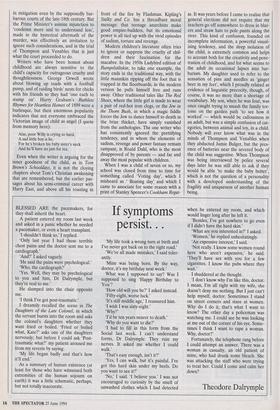If symptoms persist.. .
BLESSED ARE the pacemakers, for they shall inherit the heart.
A patient entered my room last week and asked in a panic whether he needed a pacemaker, or even a heart transplant.
`I shouldn't think so,' I replied.
`Only last year I had these terrible chest pains and the doctor sent me to a cardiograph.'
`And?' I asked vaguely.
`He said the pains were psychological.' `Who, the cardiograph?'
`Yes. Well, they may be psychological to you and him, Dr Dalrymple, but they're real to me.'
He slumped into the chair opposite me.
`I think I've got post-traumatic.'
I dreamily recalled the scene in The Daughters of the Late Colonel, in which the servant bursts into the room and asks the colonel's daughters whether they want fried or boiled. 'Fried or boiled what, Kate?' asks one of the daughters nervously; but before I could ask 'Post- traumatic what?' my patient aroused me from my reverie by saying: `My life began badly and that's how it'll end.'
As a summary of human existence (at least for those who have witnessed both extremities of the human sojourn on earth) it was a little schematic, perhaps, but not totally inaccurate. `My life took a wrong turn at birth and I've never got back on to the right road.'
`We've all made mistakes,' I said toler- antly.
`Mine was being born. By the way, doctor, it's my birthday next week.'
What was I supposed to say? Was I supposed to sing 'Happy Birthday to You'?
`How old will you be?' I asked instead. `Fifty-eight, worse luck.'
`It's still middle age,' I reassured him. 'I wish I was sixty-eight.'
'Why?'
`I'd be ten years nearer to death.' `Why do you want to die?'
`I had to fill in this form from the Social last week. I can't understand forms, Dr Dalrymple. They ruin my nerves. It asked me whether I could walk.'
`That's easy enough, isn't it?'
`Yes, I can walk, but it's painful. I've got this hard skin under my heels. Do you want to see it?'
`No,' I said. 'I believe you.' I was not encouraged to curiosity by the smell of unwashed clothes which I had detected when he entered my room, and which would linger long after he left it.
`Besides, I've got nowhere to go even if I didn't have the hard skin.'
`What are you interested in?' I asked. `Women,' he replied unhesitatingly. `An expensive interest,' I said.
`Not really. I know some women round here who aren't expensive,' he said. `They'll have sex with you for a few cigarettes. I know the pubs where they wait.'
I shuddered at the thought.
`I don't know why I'm like this, doctor. I mean, I'm all right with my wife, she doesn't deny me nothing. But I just can't help myself, doctor. Sometimes I stand on street corners and stare at women. Why do I do it, that's what I want to know? The other day a policeman was watching me. I could see he was looking at me out of the corner of his eye. Some- times I think I want to rape a woman. Why, doctor?'
Fortunately, the telephone rang before I could attempt an answer. There was a woman in casualty, an old patient of mine, who had drunk some bleach. She was attacking the staff who were trying to treat her. Could I come and calm her down?
Theodore Dalrymple
































































 Previous page
Previous page